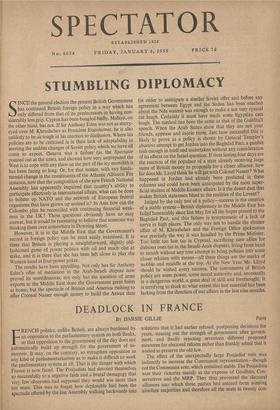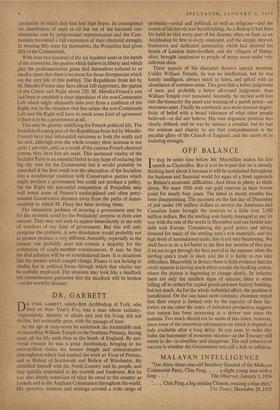DEADLOCK IN FRANCE
IF, RENCH politics, unlike British, are always burdened by an opposition to the parliamentary system on both flanks, so that opposition to the government of the day does not automatically build up strength for the government of to- morrow. It may, on the contrary, so strengthen opposition to any kind of parliamentarianism as to make it difficult to work the parliamentary system at all. That is the danger with which France is now faced. The Poujadists had devoted themselves so successfully to a negative faith and a brutal demagogy that very few observers had supposed they would win more than ten seats. This was to forget how deplorable had been the spectacle offered by the last Assembly walking backwards into solutions that it had earlier refused, postponing decisions for years, wearing out the strength of government after govern- ment, and finally rejecting seventeen different proposed measures for electoral reform rather than frankly admit that it wished to preserve the old law.
The effect of the unexpectedly large Poujadist vote was indirectly to increase the Communist representation—though not the Communist vote, which remained stable. The Poujadists won their victories mainly at the expense of Gaullists, Con- servatives and the MRP. They thus prevented the electoral alliances into which these parties had entered from winning absolute majorities and therefore all the seats in twenty con- stituencies of which they had had high hopes. In consequence the distribution of seats in all but ten of the hundred con- stituencies was by proportional representation and the Com- munists recovered a full expression of their electoral strength. In winning fifty seats for themselves, the Poujadists had given fifty to the Communists.
With over two hundred of the six hundred seats in the hands of the extremists, the parties which believe in liberty and which play the parliamentarian game find themselves reduced to so small a space that there is no room for those divergencies which are the very life of free politics. The Republican front led by M. Mende s-France may have about 160 supporters, the parties of the Centre and Right about 220. M. Mendes-France's aim had been to establish a clear opposition of the non-Communist Left which might ultimately take over from a coalition of the Right, but in the situation that has arisen the non-Communist Left and the Right will have to reach some kind of agreement if there is to be a government at all.
This may be gravely stultifying for French political life. The Socialists (forming part of the Republican front led by Mendes- France) have had substantial successes in both the north and the east, although over the whole country their increase is not quite 1 per cent., and, as a result of the curious French electoral system, they have lost six seats. This increased vitality of the Socialist Party is an essential factor in any hope of reducing the big city vote for the Communists but it would probably be quenched if the first result was the absorption of the Socialists into a nondescript coalition with Conservative parties which might produce a government but could not produce a policy. On the Right the successful competition of Poujadists may well tempt some of France's undisciplined and often petty- minded Conservative deputies away from the paths of states- manship to which M. Pinay has been inviting them.
The immediate problem of securing a government may be for the moment eased by the Poujadists' surprise at their own success. They may not wish to appear immediately in the role of wreckers of any kind of government. But this will only postpone the problem. A new dissolution would probably not at present produce a very different Assembly, especially as the present one probably does not contain a majority for the restoration of single-member constituencies. It may be that the real-solution will be on constitutional lines. It is situations like the present which compel change. France is not lacking in vitality but in political forms through which that vitality can be usefully employed. The situation may look like a deadlock but circumstances guarantee that the deadlock will be broken --at the worst by disaster.



































 Previous page
Previous page